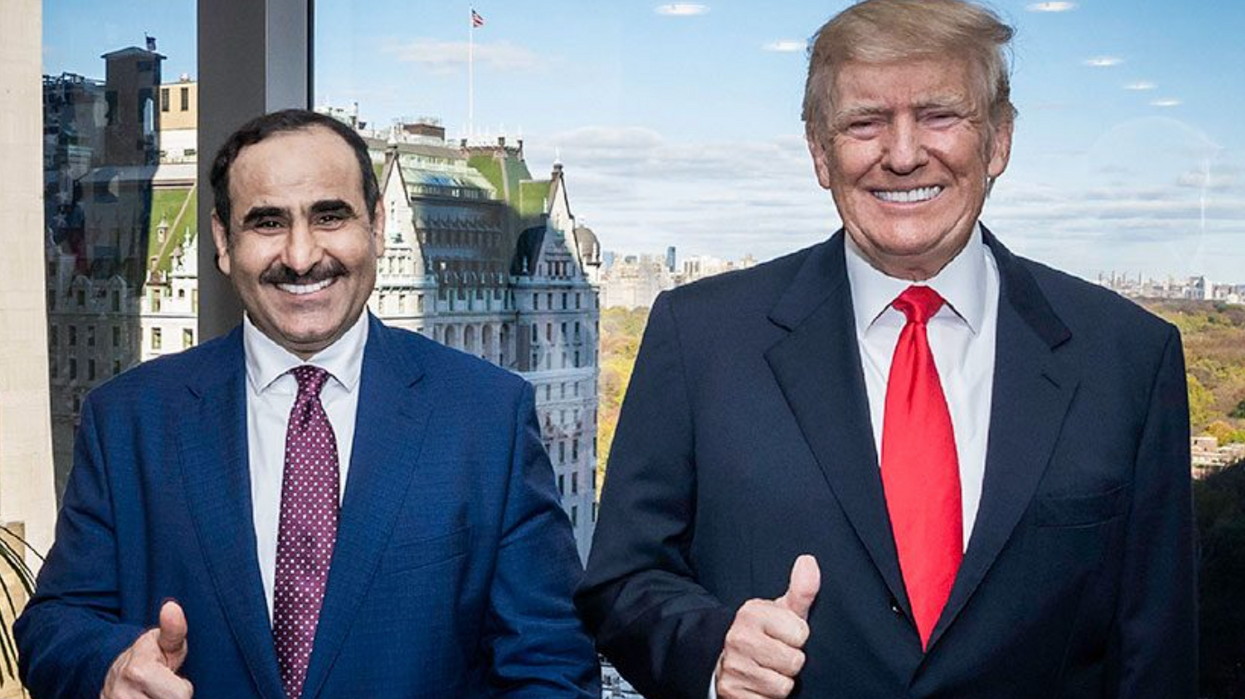After 2024 Announcement, Trump Inks $4 Billion Deal With Oman and Saudi
The word hubris comes from Ancient Greece, meaning “exaggerated pride or self-confidence.” And no word seems more fitting to describe former President Donald Trump walking into Trump Tower in New York City with his son Eric Trump last week to sign a reported $4 billion deal with a Saudi Arabian real estate company to build a mammoth project in Oman.
The word hypocrite also comes from the Ancient Greek word hypokrites, which means “an actor,” another word most fitting to describe the Republican Party, which, after winning the House by a razor-thin margin, is promising to spend every minute of its time impeaching President Joe Biden and investigating his son, Hunter Biden, amid unabashedly bogus allegations of conflict of interest.
Trump is no stranger to selling his brand, but the Saudi deal is a bold move considering that he’s just thrown his name in the hat for a third run at the presidency.
This particular deal puts him directly into murky waters. According to The New York Times, the project isn’t just some random real estate deal—it’s a deal with the government of Oman itself. Conflict of interest much?
Kathleen Clark, a law professor at Washington University in St. Louis, tells the Times, “This is yet another example of Trump getting a personal financial benefit in exchange for past or future political power. … The Saudis and Oman government may believe that giving Trump this licensing deal will benefit them in the future, should Trump become president again. This deal could be a way to ensure that they will be in Trump’s good graces.”
The behemoth AIDA project is led by the Saudi-based Dar-Al Arkan and is in conjunction with the government of Oman, which the Times reports owns the land. The concept includes 3,500 high-end villas, two hotels with around 450 rooms, a golf course (of course), and retail shops and restaurants.
This is just Trump’s most recent project with the Saudi government. Trump also hosted two Saudi-backed LIV Golf tournaments—including one in late July held just 50 miles from Ground Zero, a memorial on the location where the World Trade Center South Towers once stood. Trump stood on the sidelines and cheered despite the fact that the 9/11 families had pleaded with the former president to cancel the tournament.
According to Newsweek, when Trump was asked about the 9/11 families’ plans to protest the LIV Golf event, Trump told an ESPN reporter, “Nobody’s gotten to the bottom of 9/11, unfortunately.”
He added that the people who committed the attack on 9/11 were “maniacs” and that they did a “horrible thing to our city, to our country, to the world. … But I can tell you that there are a lot of really great people that are out here today, and we're gonna have a lot of fun, and we're going to celebrate. Money's going to charity—a lot of money's going to charity," he said.
But Trump hasn’t just been in deals with the Saudis when he wasn’t in office. During his time in the White House, his son-in-law, Jared Kushner, who worked for the administration, took in a $2 billion investment from the Saudi government to his private equity firm, Affinity Partners, per the Times.
Of course, let’s not forget the massive grifting Trump was involved in during his reign as he took in millions to the Trump International Hotel in Washington, D.C. According to the House Committee on Oversight and Reform, between 2017 and 2020, Trump’s hotel received $3.75 million from foreign governments. The Times reports that, according to the Trump Organization, profits from all of the hotel stays were paid annually to the Treasury Department.
This new Trump-Saudi project hopes to build a more robust tourism sector for Oman and likely a better relationship with the U.S. The nation refused to sign the Abraham Accords while Trump was in office, a plan that had high hopes of thawing relations between Israel and the Middle East.
All of this was announced just as Trump declared his candidacy, and the Trump family and the Trump Organization are being investigated on charges of tax fraud.
Remember, according to a report from the watchdog group Citizens for Responsibility and Ethics in Washington, Trump is the same guy who committed 3,403 conflicts of interest during his presidency. So far, the Republicans have announced zero investigations into even one of those.
Reprinted with permission from Daily Kos.



